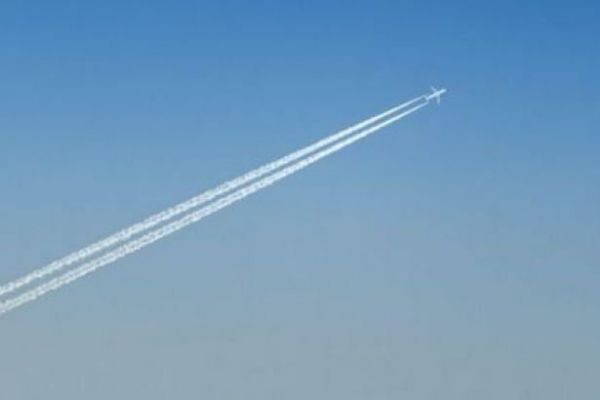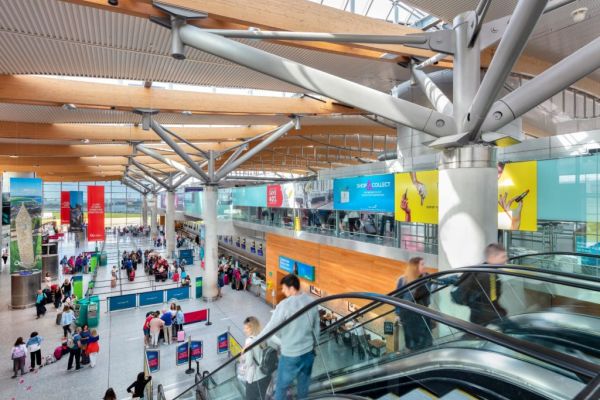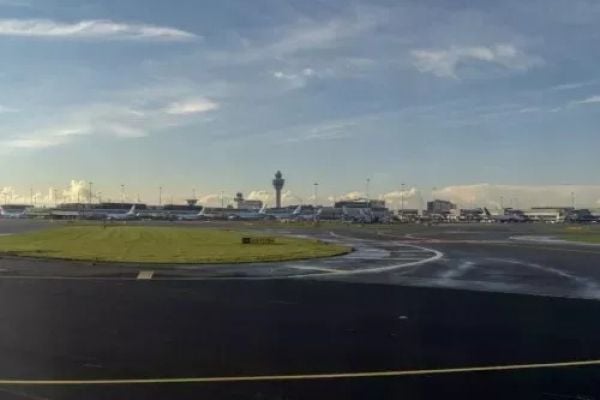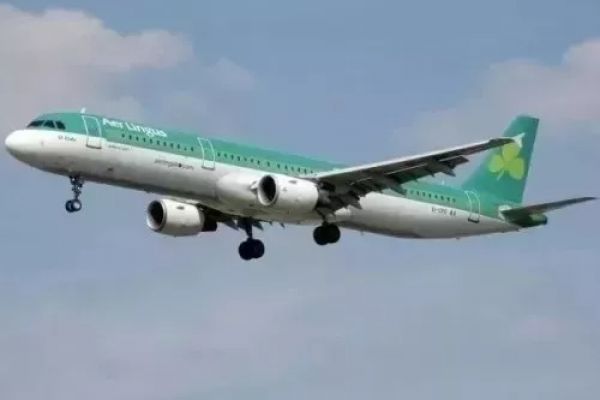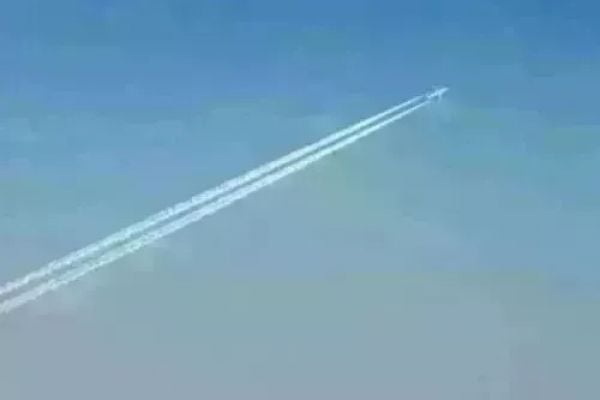Hospitality Ireland presents a round-up of the latest airline and aviation news from around the world.
United Says Approximately 90% of US Staff Vaccinated Ahead Of Company Deadline
United Airlines said on Thursday September 16 that close to 90% of its US-based employees had uploaded proof of COVID-19 vaccinations ahead of the company's September 27 deadline.
United has taken a tough stance on employees who decline to get vaccinated and in early August became the first US carrier to announce it would mandate vaccines for employees.
The company also said that approximately 95% of its US-based management was fully vaccinated.
United Chief Executive Scott Kirby told CNN the airline would not require vaccines for airline passengers on its own but would follow a government mandate if adopted.
Kirby said it "feels like a more efficient approach" for employers to mandate vaccines rather than create a "huge infrastructure" at airports to prove passengers have been vaccinated.
Last week, United said employees who receive religious exemptions from the company for COVID-19 vaccinations would be placed on temporary, unpaid personal leave from October 2.
Chicago-based United said that nearly 20,000 employees had uploaded records since the company announced its mandatory vaccination policy.
The Biden administration said on Monday September 13 that most federal employees must be fully vaccinated against COVID-19 no later than November 22, pushing large employers to have their workers inoculated or tested weekly.
Some airline officials told Reuters that they are waiting to see a Labor Department emergency temporary standard (ETS) detailing rules for large private-sector firms on vaccines or COVID-19 testing before deciding on employee rules.
US Commerce Secretary Gina Raimondo told travel executives on Wednesday September 15 that the ETS order is expected in "a matter of weeks...We have been told in October."
Airlines are also waiting for guidance due by September 24 from the Biden administration about whether they are covered under an executive order mandating vaccines for federal contractors.
Southwest Airlines said on Thursday September 15 it told employees that it would offer roughly two days of pay to employees who are fully vaccinated for COVID-19 and share their vaccination status by November 15.
Southwest said that starting on November 16, employees must be fully vaccinated against COVID-19 in order to be eligible for quarantine pay.
Tougher EU Airport Slot Rules Trigger Asia Retaliation Threat And Risk Industry Trade War
Regulators in Asian hubs like Singapore and Hong Kong have threatened to retaliate against European Union plans to force airlines to start using take-off and landing slots frozen during the coronavirus pandemic, a move that could oblige Europe's carriers to fly empty seats for thousands of miles at a loss.
Authorities controlling slots at major Asian airports are ready to slap similar 'use it or lose it' conditions on European carriers flying to Asia's cities - raising the prospect of an industry trade war over the uneven impact of COVID-19.
After rare unity during the pandemic, when carriers were being bailed out or trying to stay afloat, industry leaders say the dispute has rekindled fundamental differences across a fragmented sector as the world stages a multi-speed recovery.
"Is it a trade war? Certainly the germ of one," said former Australian aviation negotiator Peter Harbison, chairman emeritus of the Sydney-based CAPA Centre for Aviation consultancy.
"And it will be accentuated as more airlines collapse and international markets remain closed, or at best, uncertain."
Tensions have grown since July, when the EU announced plans to force airlines to use 50% of their rights or lose them to rivals from next month. That move partially reinstated competition rules that had been waived as airlines struggled to survive the pandemic.
But while the EU decision reflects a traffic recovery that is well under way in Europe's mainly short-haul market, Asian carriers are protesting they will be unfairly penalised because their long-haul networks will take much longer to recover.
Some Asian regulators have already put European airlines on notice that they will need to fly at least 50% of the time, industry sources said, risking political fights over the future of transport links that are important for global trade.
Singapore, one of several Asian jurisdictions to line up previously unreported 'reciprocity' rules, has included the provisions to ensure fair treatment, said Daniel Ng, director air transport at Civil Aviation Authority of Singapore.
In Asia, long quarantines remain the norm for travellers and airlines operated just 14% of their 2019 international capacity in July, well below the 46% of 2019 levels seen in Europe and 48% in North America, International Air Transport Association (IATA) data shows.
Cathay Pacific last month warned publicly that the slower recovery in Hong Kong meant it risked losing prized overseas airport slots and harming the city's hub status.
Taiwan's China Airlines and Korean Air Lines expressed concern about the EU rules in statements to Reuters, while Singapore Airlines declined to comment.
In Europe, Lufthansa - the EU carrier with the most flights to Asia - said that the tough EU rules could ultimately harm the climate as well as airlines, if they are forced to fly empty planes to keep slots. Air France and KLM said their decisions to fly were not based on airport slots.
The EU broke with a global industry recommendation and tightened rules for the winter schedule season, which runs from October to March, after heavy lobbying by low-cost carriers like Ryanair, with big short-haul networks, and European airports, many of which are privatised and trying to produce returns.
"We're no longer in immediate shock phase," said Aidan Flanagan, safety and capacity manager at Airports Council International Europe. "We are now in a situation where the market is stable with much lower levels than what we were in 2019, but it's stable."
The European Commission said in July the 50% use rate - down from 80% in normal times - was chosen to ensure good use of airport capacity and to benefit consumers. It also granted exceptions so that airlines do not need to reach 50% while strict measures like quarantine that make it hard to travel remain in place.
The Commission did not respond immediately to a request for comment.
Once travel restrictions are lifted, Asian carriers will have to boost flying to the European Union within six weeks or risk losing slots even if demand is slow to return.
"When the demand is not there it is unreasonable to expect people to operate," IATA Head of Worldwide Airport Slots Lara Maughan said. "It is a really short window they have once restrictions are removed to sort of recalibrate that whole operation back."
René Maysokolua, managing director of German airport slot manager FLUKO, said his organisation had been informed that some Asian countries were telling European airlines they would need to fly 50% of the time or risk losing their slots in retaliation for the EU rules.
Singapore, Hong Kong and South Korea are among those taking a harder line against European carriers, said an industry source who was not authorised to comment publicly on the matter.
Authorities in Singapore and Hong Kong confirmed reciprocity provisions are in place but declined to comment on specific cases.
Korea Airport Schedules Office did not respond to a request for comment, but Korean Air, a member of the country's slot working group, confirmed the provisions.
Meanwhile, even as the potential for conflict brews between Asia and Europe, the United States on Thursday September 16 announced more lenient winter season rules for international carriers than the European Union.
Qantas Airways Weighs New Pay Structure To Keep Key Executives
Qantas Airways Ltd said on Friday September 17 that it was considering new ways to structure pay to ensure it could retain key executives as it enters the third financial year affected by the pandemic-driven slowdown in travel.
Qantas Chairman Richard Goyder said executives had faced a high workload with no annual bonuses for the last two years, and a continued wage freeze at a time when attrition was rising across the airline.
"Our executive cohorts are talented and in increasing demand across a range of industries, many of which, unlike aviation and tourism, are experiencing high rates of growth and activity, with financial rewards to match," he said in the airline's annual report.
In the case of CEO Alan Joyce and executive management, any incentive plan would take the place of the traditional annual bonus plan, Goyder said, adding that a decision was expected in the second half of the financial year.
Joyce's total annual pay rose to A$1.97 million ($1.44 million) in the 12 months ended June 30, up 13% from a year earlier, when he had taken a period of zero base pay, but his pay remained 80% below pre-COVID levels.
Joyce has said he expected to stay in his role until at least July 2023 to complete a three-year recovery plan designed to cut ongoing annual costs by A$1 billion.
In a separate note to staff seen by Reuters, Goyder said the company would look to reward all employees if the recovery plan is completed successfully by that date.
"Nothing is finalised but we look forward to sharing more detail in the first quarter of next year," he said.
Other companies in the travel sector, including Flight Centre Travel Group Ltd and Air New Zealand Ltd, have offered shares to all employees as part of retention efforts.
Aegean Airlines Shrinks Loss In Second Quarter; Sales Jump
Aegean Airlines posted a smaller second-quarter loss than a year earlier on Friday September 17 as Greece's largest carrier saw traffic more than double.
A net loss of €33.9 million for the April-June quarter was less than half the 73.4 million loss it suffered a year earlier.
Sales rose 168% to €108.6 million.
The member of the Star Alliance airlines group said flight operations in the quarter remained at just 35% of those seen in the pre-pandemic second quarter of 2019.
The airline flew 1.2 million passengers on 15,000 flights.
Aegean's cash reserves stood at €545 million at the end of June.
"With the lifting of restrictions since the end of May airline activity showed signs of recovery. We had positive cash flow for the first time in 18 months," CEO Dimitris Gerogiannis said.
AirAsia X Aims For End-Of-October Creditor Meetings As Talks Progress
Malaysia's AirAsia X Bhd (AAX) has made "substantial progress" in months-long talks with creditors as it aims to convene meetings with them to vote on a restructuring scheme by the end of October, its chief executive said.
Benyamin Ismail told Reuters in a telephone interview that negotiations with lessors, plane maker Airbus SE and service providers had progressed, but declined to share details.
The airline, an affiliate of AirAsia Group, also hopes to complete talks with potential investors for its recapitalisation by the end of the year.
"We plan to raise funding in December and get that completed as soon as possible," Benyamin said, declining to reveal details about the potential investors.
Benyamin said talks with creditors were in the final stages and all had indicated they want to see the airline proceed with its restructuring.
There were no objections to a proposal to move engine maker Rolls-Royce Group into the same classification as most other creditors, he added.
The airline said in a stock exchange filing that "final negotiations are still ongoing, particularly with respect to commercial arrangements going forward".
In a court document filed on Monday September 13, AAX said negotiations were still afoot but "various letters of undertaking have been secured" from creditors.
Many lessors have already struck other agreements with Southeast Asian airlines to take back planes early or reduce rates, at least temporarily, to help them survive the plunge in air travel caused by pandemic.
"Drafts of the lock up agreements and term sheets were sent to the lessors on (May 18). The lessors are presently in the process of reviewing them," AAX said.
The airline told the court it has received signed letters of undertaking from three large creditors to support and vote for the scheme, namely Honeywell International, Bridgestone Aircraft Tire Company and Sky High I Leasing Company.
AAX proposed last October to restructure 64.15 billion ringgit ($15.43 billion) of debt, drawing objections from more than a dozen creditors, many of them lessors.
Airbus, the airline's biggest creditor, filed an affidavit in December saying that it stands to lose more than $5 billion worth of orders if the scheme goes through. It declined to comment on the restructuring process.
This week, the court granted AAX an extension to hold its creditors meetings by March next year, when a restraining order preventing creditors from filing fresh lawsuits against the airline expires.
Shukor Yusof, head of Malaysia-based aviation consultancy Endau Analytics, said AAX's low-cost, long-haul model was no longer sustainable due to the pandemic.
"Creditors, including lessors and Airbus, understandably don't want to see the airline fall as they stand to lose a lot. The decision to work with AirAsia X to restructure is to salvage whatever they can," he said.
News by Reuters, edited by Hospitality Ireland. Click subscribe to sign up for the Hospitality Ireland print edition.
